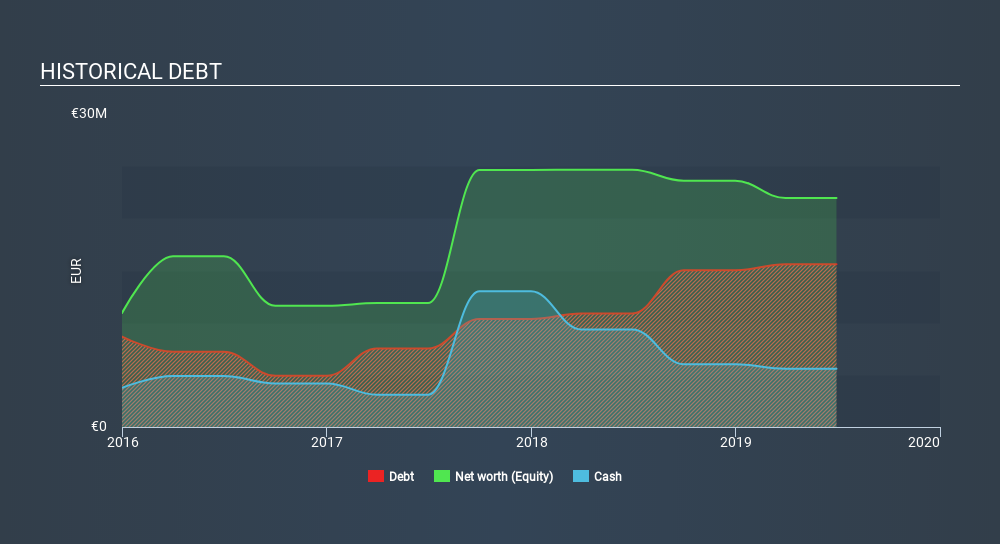
Legendary fund manager Li Lu (who Charlie Munger backed) once said, 'The biggest investment risk is not the volatility of prices, but whether you will suffer a permanent loss of capital. It's only natural to consider a company's balance sheet when you examine how risky it is, since debt is often involved when a business collapses. We can see that DBA Group S.p.A. (BIT:DBA) does use debt in its business. But the more important question is: how much risk is that debt creating?
What Risk Does Debt Bring?
Generally speaking, debt only becomes a real problem when a company can't easily pay it off, either by raising capital or with its own cash flow. In the worst case scenario, a company can go bankrupt if it cannot pay its creditors. However, a more frequent (but still costly) occurrence is where a company must issue shares at bargain-basement prices, permanently diluting shareholders, just to shore up its balance sheet. Of course, debt can be an important tool in businesses, particularly capital heavy businesses. The first step when considering a company's debt levels is to consider its cash and debt together.
Check out our latest analysis for DBA Group
What Is DBA Group's Debt?
You can click the graphic below for the historical numbers, but it shows that as of June 2019 DBA Group had €15.6m of debt, an increase on €10.9m, over one year. However, it also had €5.59m in cash, and so its net debt is €10.00m.

How Strong Is DBA Group's Balance Sheet?
The latest balance sheet data shows that DBA Group had liabilities of €27.7m due within a year, and liabilities of €5.99m falling due after that. Offsetting this, it had €5.59m in cash and €24.2m in receivables that were due within 12 months. So its liabilities total €3.83m more than the combination of its cash and short-term receivables.
Given DBA Group has a market capitalization of €20.5m, it's hard to believe these liabilities pose much threat. Having said that, it's clear that we should continue to monitor its balance sheet, lest it change for the worse. There's no doubt that we learn most about debt from the balance sheet. But it is future earnings, more than anything, that will determine DBA Group's ability to maintain a healthy balance sheet going forward. So if you're focused on the future you can check out this free report showing analyst profit forecasts.
In the last year DBA Group's revenue was pretty flat, and it made a negative EBIT. While that hardly impresses, its not too bad either.
Caveat Emptor
Over the last twelve months DBA Group produced an earnings before interest and tax (EBIT) loss. To be specific the EBIT loss came in at €308k. When we look at that and recall the liabilities on its balance sheet, relative to cash, it seems unwise to us for the company to have any debt. So we think its balance sheet is a little strained, though not beyond repair. Another cause for caution is that is bled €1.9m in negative free cash flow over the last twelve months. So suffice it to say we consider the stock very risky. For riskier companies like DBA Group I always like to keep an eye on the long term profit and revenue trends. Fortunately, you can click to see our interactive graph of its profit, revenue, and operating cashflow.
If you're interested in investing in businesses that can grow profits without the burden of debt, then check out this free list of growing businesses that have net cash on the balance sheet.
If you spot an error that warrants correction, please contact the editor at editorial-team@simplywallst.com. This article by Simply Wall St is general in nature. It does not constitute a recommendation to buy or sell any stock, and does not take account of your objectives, or your financial situation. Simply Wall St has no position in the stocks mentioned.
We aim to bring you long-term focused research analysis driven by fundamental data. Note that our analysis may not factor in the latest price-sensitive company announcements or qualitative material. Thank you for reading.
About BIT:DBA
DBA Group
Provides consultancy, architecture, engineering, and project management services.
Flawless balance sheet and good value.
Market Insights
Community Narratives



